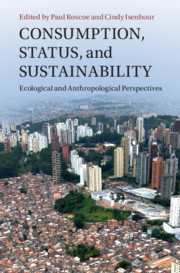Book contents
- Consumption, Status, and Sustainability
- New Directions In Sustainability And Society
- Consumption, Status, and Sustainability
- Copyright page
- Contents
- Figures
- Tables
- Contributors
- Preface
- 1 Standing Out, Fitting In, and the Consumption of the World
- Part I Status Competition and Hierarchy in Human Societies
- 2 “Status” Pursuits in Prehistory, and the Condition We Are In
- 3 Conflict Management, Status Competition, and Consumption in New Guinea, Medieval England, and Contemporary Britain
- Part II Variability in Status Consumption
- Part III Continuity and Discontinuity
- Part IV Bending the Curve
- Index
- References
2 - “Status” Pursuits in Prehistory, and the Condition We Are In
from Part I - Status Competition and Hierarchy in Human Societies
Published online by Cambridge University Press: 30 July 2021
- Consumption, Status, and Sustainability
- New Directions In Sustainability And Society
- Consumption, Status, and Sustainability
- Copyright page
- Contents
- Figures
- Tables
- Contributors
- Preface
- 1 Standing Out, Fitting In, and the Consumption of the World
- Part I Status Competition and Hierarchy in Human Societies
- 2 “Status” Pursuits in Prehistory, and the Condition We Are In
- 3 Conflict Management, Status Competition, and Consumption in New Guinea, Medieval England, and Contemporary Britain
- Part II Variability in Status Consumption
- Part III Continuity and Discontinuity
- Part IV Bending the Curve
- Index
- References
Summary
With the development of Upper Paleolithic and Mesolithic technology and the ability to produce surpluses, ca. 35,000 years ago, the door was open for aggrandizers to pursue a number of surplus-based strategies to benefit themselves and transform cultures into the competitive consumption arenas familiar to us today.
- Type
- Chapter
- Information
- Consumption, Status, and SustainabilityEcological and Anthropological Perspectives, pp. 33 - 58Publisher: Cambridge University PressPrint publication year: 2021



